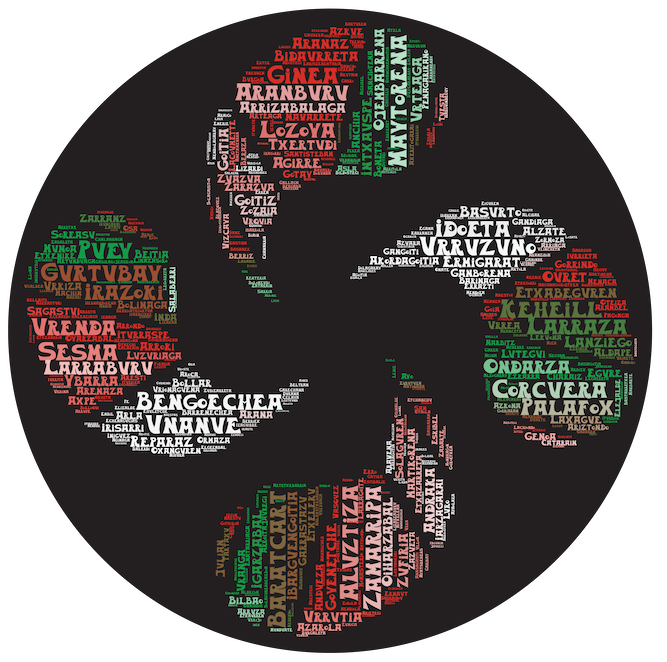Magunagoikoetxea. Gorostiaga. Arroitajauregi. Bastarretxea. Basque last names are as distinct as they are complex, at least to an English tongue. It is only relatively recently that children took the names of their parents. Rather, Basques were often, though not universally, known by the names of their houses, which were in turn based upon the location of the house. Thus, most Basque names are toponymic in nature — derived from the name of a place. For instance, Uberuaga comes from ur+bero+aga, meaning water+hot+place or hot springs.

- Basque surnames tend to come in five varieties:
- Surnames relating to the origin of the bearer. As opposed to the toponymic names, these are names indicating where a person was from, not where they lived or were born.
- Patronymic, where the name is taken from an ancestor (most names in the Christian world, including the modern Basque Country, are patronymic in nature, at least in how they are used today).
- Descriptive, or adjective, names, describing the person physically. Though not common today, in the earliest recorded documents of the Basque Country, these were relatively common. Names like Domenca Beguiurdiña “Domenca the blue-eyed”, Johan Belça “Johan the black”, Domingo Chipia “Domingo the little”, and Sancha Ederra “Sancha the beautiful” are documented in the 13th century and earlier.
- Nouns that are either nicknames or describe the bearer in some way, such as Domingo Echayuna “Domingo the house owner”, Domingo Erlea “Domingo the bee”, and Gra (possibly short for Grace) Sauela “Gra the belly.”
- Toponymic names, nouns and adjectives, simply juxtaposed with the first name, which refer not to personal particularities, but to the place of birth or residence of the bearer and its characteristics. This is the original origin of the type that abounds so much in current Basque surnames.
- As late as the 16th century, surnames in the Basque Country weren’t as fixed as they are today. While people had names from their parents, a requirement of the Catholic system, they also went by the name of the house they were either born or resided in. Even to this day, people can be known by the house they live in rather than their formal surname.
- There is a lot of variation in the historical record in how Basque names are spelled. This is due to a couple of reasons. First, depending on where you lived, you tended to use either Spanish or French alphabets to write the names. Because some Basque sounds don’t have equivalents in either or both languages, this leads to different choices in how to spell a name. Further, different sounds are represented by different letters in Spanish and French. While Basque and Spanish ‘s’ are similar in sound, Basque and Spanish ‘z’ are not. The opposite would be true between Basque and French.
- Thus, in my own research, I’ve found a multitude of spellings for the same name. As one example, modern Idoeta can be written as Ydoeta and Ydueta. This certainly makes doing genealogy research a bit more challenging.
- If you are interested in learning about your own Basque surname, we have a list of some surnames we’ve provided information about in the past. For names not on the list, the best option would be to ask at the Basque genealogy group at groups.io. Run by Cecilia Puchulutegui, this is an excellent forum for asking about your name. The people there are all very helpful and willing to provide what information they can.
Primary source: Mitxelena Elissalt, Koldo. Apellido. Enciclopedia Auñamendi. Available at: http://aunamendi.eusko-ikaskuntza.eus/es/apellido/ar-1383/
Discover more from Buber's Basque Page
Subscribe to get the latest posts sent to your email.


Greetings,
there is the New Mexico DNA project–DNA and Genealogy among other disciplines. The director is Angel Cervantes. Google New Mexico DNA project.
Monique
What do you know of the surname Eres respond to mjeres83@gmail.com